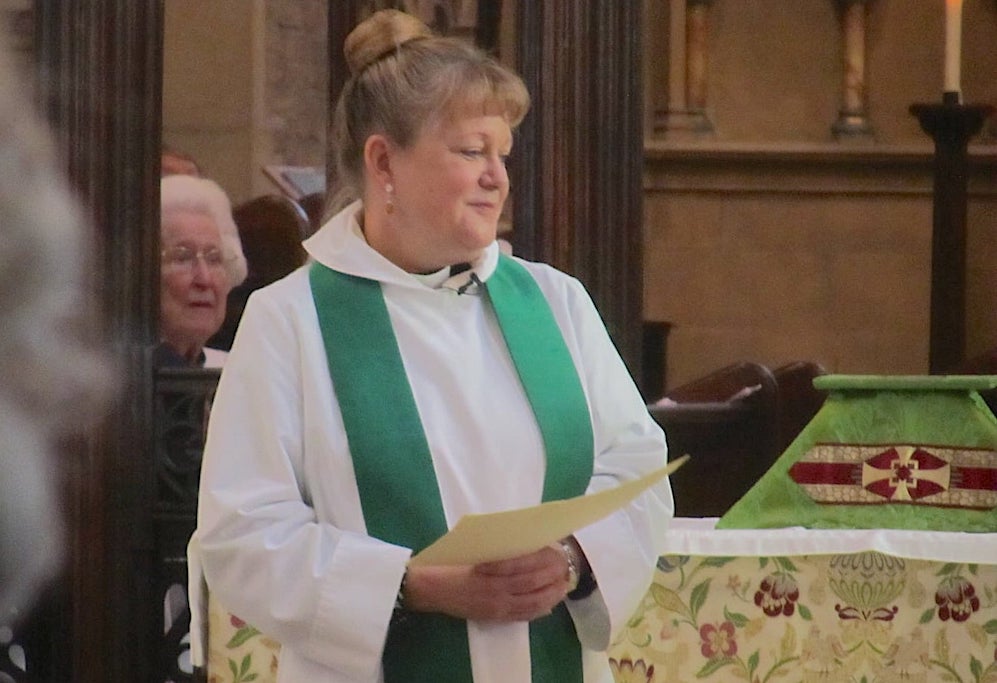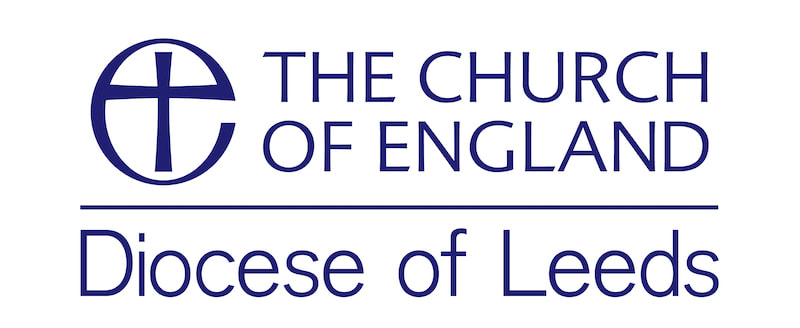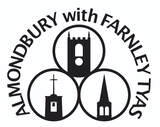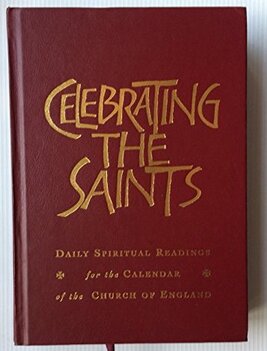 Dear Sisters and Brothers in Christ, The summer months have always been precious to me. As a child they meant 11 weeks of pretty much doing as I liked. Sure we (my five brothers and sisters) were sometimes dragooned into weeding the garden, or tidying the house, or some other chore, but mostly my mom let us be, and that meant we had not only our own beautiful farm to roam on, but the land all around us owned by our neighbours. I especially liked getting out of the house and into some quiet place to read my book. We had a large family, and so a bit of quiet was always appreciated. Our house was kind of small, so in the winter months it was not that easy to find solitude, but in the summer I had a whole range of places that were quiet, comfortable, and special where I would sit and read my book, or just lay on the ground and look up at the sky through the green canopy of the oak trees. That was one thing that was quite special about our farm, it has an abundance of oak trees which is not that common in the area, and I don’t know why it was so. Mostly the woodlands where I grew up were made up of fir and pine. I have always loved a grove of oaks, the way they stretch out their arms and sort of reach outward as well as upward, embracing and kind of lifting one up. Last week I went to Durham and spent time in the cathedral attending services and just enjoying the atmosphere of peace and ‘otherness’ with a friend, after a very busy time at work. And of course, in addition to spending a fair amount of time sitting in the cloisters drinking coffee and eating cake from the café (they now have tables in the cloister where you can eat food from the café, I highly recommend it) I did visit the gift shop…okay I visited the gift shop on numerous occasions! One of my purchases was a book by David Adam* who was vicar of the church at Lindisfarne. This week I began reading it, and as usual I quickly ran into thoughts that resonated with me and that I wanted to share with all of you. What a fortunate person, to serve God on Lindisfarne, and it's not surprising that his topic is holy places and pilgrimage. It really struck me when I read: ‘I believe that we rarely discover that the world is a holy place until we have found one holy place’. He goes on, ‘Once we find one holy place there is a chance for all to become holy’ (9). Coincidentally, though perhaps not so coincidentally, because I often find that God provides us what we need from many different sources, I also read something in another book that also spoke to this theme. I often read from the book Celebrating the Saints** during my morning prayers which is a collection of daily readings that follow the calendar of saints and inspirational people celebrated in the Church of England Calendar. I picked up this book in the gift shop at Canterbury Cathedral last year…okay, I know you are beginning to sense a theme here! Anyhow, I was curious about the different saints and saintly people that pop up in our daily calendar and this book has been a great way to begin to get acquainted with these people. So on August 4 (my father and sister’s birthdays, but that may be one to many coincidences!) There was a reading from the spiritual guide, Jean-Baptiste Vianney. And in one passage he writes: ‘Prayer is nothing less than union with God. When the heart is pure and united with God, it is consoled and full of sweetness; it is transfigured by a wonderful light’ (292). Reading the words of David Adams and Jean-Baptiste Vianney together again helped to remind me that this world, this most amazing and beautiful and life sustaining place, is an emanation of God’s love pure and simple. There are holy places all around us, places where when we stop and exist solely in God’s presence, place where the prayer of our heart bursts spontaneously from us, both enabled by the place in which we are, and the love that God that continually pours into our being. When this happens, that place, no matter where it is, becomes holy, and we step out of the linear time of our mortal lives, and live in God’s eternity. I think the Holy Spirit taught me this before I even understood, in those quite summer days lazing about in the cool and quiet places of our farm in Yelm. Holy places surround us, and the place where we are, becomes one those holy places through prayer, through quieting ourselves in God’s presence, or sometimes simply through the coming of the Holy Spirit upon us, it can happen to anyone at any time! Churches, Cathedrals, forests, mountains, oak groves, our own gardens large or small, a corner of a room in a comfortable chair, sitting on the couch with a cat purring or a dog resting beside one, these are holy places. My readings this week reminded me that when the ‘business’ of the world is too much with me, then I only need to step into a holy place, opening myself to God’s presence, to be refreshed and strengthened in body, mind, and spirit. With Blessings and Love Jessica *David Adam, The Road of Life: Reflections on Searching and Longing (2004). **Celebrating the Saints: Daily Spiritual Readings to Accompany the Calendars of the Church of England...new revised edition, ed. Robert Atwell (2016).
0 Comments
Last week the Gospel reading was from Luke, and describes the commissioning of the 70 disciples to share the Good News (Luke 10.1-11, 16-20), and prepare the people for the coming of Jesus into their towns and villages. He tells them, as we all know, not to prepare for this journey in the ordinary way, by packing extra clothes, or food, or money, or even sandals. Instead they are to go, as it were, vulnerable into the world, ‘See I am sending you out like lambs into the midst of wolves.’ I’m not sure I would be so keen to go on that journey. I remember my own commissioning, and I was kitted out by the Church of England with an alb, a cassock, four beautiful stoles and a surplice, and sent to the care filled and generous hands of all of you in the Almondbury with Farnley Tyas parish. So the challenge Jesus is setting before the disciples is really hard, and frightening. Of course they were going with Jesus’s blessing, with his teaching in their minds and in their hearts, and while they had not experienced Pentecost, I think we can safely say the Holy Spirit journeyed with them. Still, why was Jesus so prescriptive? Would a few extra tunics and some sandals, and perhaps a few denarii for a hotel really compromise their mission? Clearly, Jesus thought so, and its important for us to consider why. The clue is in the following verses. They are to go to the villages and offer themselves, and their unique spiritual understanding, and relationship to God’s kingdom, to each village they enter. They are to arrive at each village devoid of any of the markers of status that would ensure a welcome. They are to arrive vulnerable and weak. Then they are to offer their particular gifts, and then wait and see if these are accepted, despite their humble appearance. If a village welcomes them, provides them with hospitality, cares for them, then they are instructed to stay and to work within that village through teaching, through healing, through whatever gift the particular disciples have at their disposal. Basically, the disciples have to enter into a partnership, into a relationship with the people that they meet, because only in this way can the Kingdom of God truly be in these places, be in their lives. The disciples are not some kind of special emissary with extra ordinary powers that are uniquely able to do things others cannot. No. The disciples are co-workers with the villagers. The villagers and the disciples are to work together to give and care for each other. And in this way, the Kingdom of God becomes manifest in their villages. Then miracles happen. It's useful to remember Jesus’s visit to Nazareth when the people would not enter into partnership with him, would not enter into a relationship with him because they thought they ‘knew’ him, and expected him to remain in the ‘social box’ they put him in—i.e. that of the son of a local carpenter. He could do no deeds of power there, because they would not enter into a relationship with him of mutual giving. They would not let go of their earthly understanding of status and power and privilege. One of the key values that our parish has identified is inclusivity, and this is absolutely correct. Because we can do no deeds of power in our churches, in our communities, unless we are inclusive. The successes, the miracles, the signs of God’s Kingdom that we have seen in our parish all come from working together, from accepting freely the gifts of other, and by giving the gifts we have to others. We most fully live out that rich life that Jesus promises when we come together humbly, with no purse, no sandals, no extra tunics—i.e. when we leave off the trappings of status, position, and other worldly markers of ‘worthiness’. We most fully live that rich life together when we leave off the ideas of ‘it's their job’ or 'it's my job’ and instead open up our hearts and work in partnership, providing what is needed to each other as the need presents itself, and accepting from those sent to us what we need – who ever they are, and despite whatever ‘official’ role they have in our parish and in our community. As Jesus says we need to ‘eat what is set before us’, uncritically and in love and companionship. When we live in generous, inclusive relationships with each other, in our communities and in our world, then truly, ‘the Kingdom of God has come near’, and truly we can do mighty deeds of power. With all blessings, Jessica  Dear Brothers and Sisters in Christ, The coming of the Holy Spirit to the disciples of Christ, Pentecost. This is one of the most profound moments in life of the church, it was the moment when a group of men and women received their commission to spread the good news that God’s saving promise to the world had been fulfilled through Jesus Christ. This moment is too overwhelming to really imagine. The Holy Spirit filled the place where they stood and they were changed forever. It is an amazing moment, and it is an overwhelming moment. When we read it in Acts its almost too much. And so there is a tendency to let that moment stay within the pages and the words of Acts, we read it in church, we read it in our homes, and we close up our well – worn favourite bible, and put it back on the shelf. The priest takes off her red stole, and perhaps red chasuble, and the red altar cloths are changed to green, the drawings by school children of flames are stuck up on a board and to start fade and get a little crinkled. Pentecost done for another year, the long period of ordinary time beckons, holidays, warm summer nights (hopefully) and in our church life we take a little rest before preparing for the celebrations of the autumn and winter, All Hallows, All Souls, Advent and Christmas. The Holy Spirit, of course doesn’t take a ‘little rest’. And I think this is why, while the description of the Holy Spirit coming so forcefully into the lives of the disciples at Pentecost is exciting, and inspiring. I like Jesus’s description to Nicodemus in that quiet evening conversation Jesus had with that fallible and faltering man at the very beginning of Jesus’s ministry, and the very beginning of Nicodemus’s relationship with the Holy Spirit. Jesus describes the Holy Spirit using the imagery of the wind: “The wind blows where it chooses, and you hear the sound of it, but you do not know where it comes from or where it goes. So it is with everyone who is born of the Spirit.’ (John 3.8). At first this imagery is a bit puzzling. But when we sit with it for a little while we start to understand. The Holy Spirit can come in great gusts of wind, it can feel like a flame that ignites our hearts, our inspiration and emboldens us to do hard things and heroic actions. Certainly this is what the first disciples needed if they were going to take on the Roman world and all the misconceptions, selfishness, egotism, and cruelty upon which that world was built and through which it functioned. And sometimes we need much the same kind of courage for the work God calls us to do, and then the Spirit comes to us boldly. I remember when I was being ordained deacon, in days of the retreat leading to this awesome event some of my fellow ordinands talked about stories they had heard of the Holy Spirit coming on those being ordained so profoundly that they fell over when the Bishop laid hands on them. I secretly hoped that would not happen to me, and secretly hoped it would! In the end the Holy Spirit was in that place, as powerfully as I had ever experienced. I did not fall over, but I felt a joy that was so intense that this will forever remain for me one of the most important moments of my life. But this is not what happens to most of us, most of the time, and indeed it is not how the Holy Spirit worked in the lives of the disciples and the early church most of the time. Most of the time the Holy Spirit comes to us just as Jesus described, as a wind, a breeze, sometimes gentle, sometime with some force. We don’t know where it comes from, it often takes us by surprise, and sometimes we don’t even know it has come at all. Think of those times when you simply acted and did good for someone else—without thought, and later marvelled that you did the right thing at the right time. Sometimes the Holy Spirit works through us and we don’t even know she is doing it. Or have you ever considered why beauty has such an effect on you, a piece of music, a painting, the sunrise in the morning, a tree bursting in bloom, a landscape, a sculpture, a piece of poetry? It is the Holy Spirit that enables our souls to respond to beauty, to goodness, to life. So yes, there have been times when I desperately yearned for the Holy Spirit to come upon me with power, like in some revival tent, and bowl me over. And I have to say, I still think that would be pretty exciting to be in a room with my brothers and sisters when the Holy Spirit descended upon us in glory and power, in tongues of fire and yes violent wind. But I have learned that perhaps the most powerful coming of the Holy Spirit in our lives, is more like a gentle breeze that helps us to do God’s will on this earth in our every day lives. Jesus gently chided Nicodemus for not understanding the way in which the Holy Spirit works in each of us, shaping us, helping our own spirits to grow in those little everyday manifestations of the Spirit of God. The wind that is the Holy Spirit truly fills our lives and enables us to be part of that wind, to truly be reborn in spirit. Jesus came to us so that we could have life and have it more abundantly, and the Holy Spirit works through us and in us to give us, and every one of us, this life within God’s love. Happy Pentecost, Jessica. 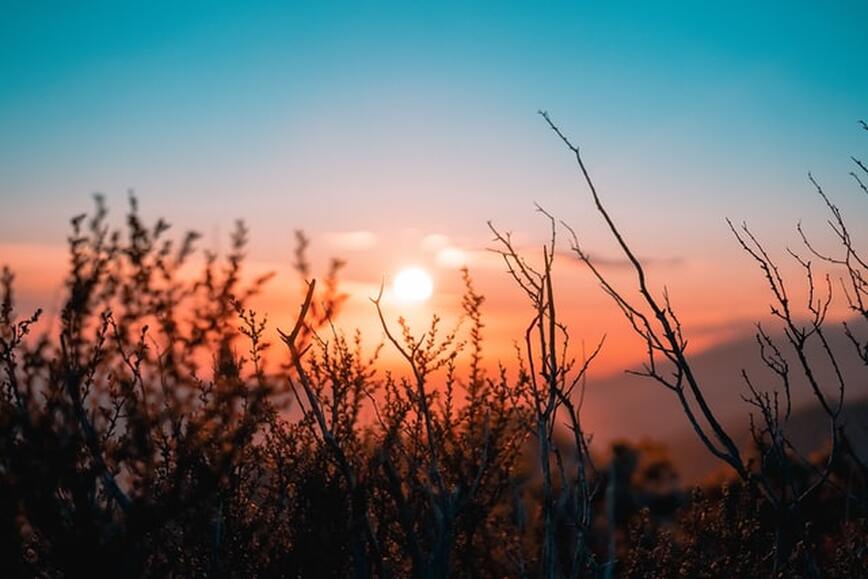 Dear Brothers and Sisters in Christ, I was doing some cleaning the other day, not something I ever quite do enough of I’m afraid, and I ran into a poem by Eleanor Farjean which got me thinking about her more famous poem, Morning Has Broken. Now as a child of the 60s I never actually knew that this poem was written by a women, or even that it was a hymn. My mom was a great fan of Cat Stevens, and I thought the lyrics, as well as the music were his. I don’t know when I first found out my mistake, but I remember every time we get to sing this hymn, I smile and think of Eleanor. This is a long winded way of saying that running into Farjean’s other poem made me think of Morning Has Broken. Okay, and now you are wondering how I run into poems while I’m cleaning… yes, you guessed it, I was dusting the bookshelf and just had to pull out an old book of poems from my childhood. Such are the dangers of dusting a bookshelf. In my morning prayers then, I opened up Morning Has Broken and had a read through it, well more of a hum through it, and I was struck yet again by the final stanza. Let me remind you: Mine is the sunlight, Mine is the morning, Born of the one light Eden saw play; Praise with elation, Praise every morning, God’s re-creation Of the new day. This is a powerful image of the gift of the Resurrection. In the difficult news of the day, and the challenges of our own lives, how often do we forget what Jesus accomplished for us, what his life, his death and his resurrection made possible for each and everyone of us. We know that the work a day world is not perfect, in fact it is feeling quite unsettled and even frightening, but Jesus told us so vividly in the gospels that we are not to worry, that even the birds of the air and the flowers of the field are counted and beloved by God. And as are they, so are we. We can choose to spend our mental ‘day’ reading about horrors, worrying about tomorrow, turning our face away from the sunlight, forgetting the morning. But that doesn’t mean the sunlight, the morning, new creation, the one light are not still there waiting for us to notice. It was Eleanor Farjean’s genius to remind us that we live in God’s creation, we are God’s beloved, we are given a new day each and every day, and that through Jesus’s life and his resurrection, we have hope, and through that hope we can live lives that are more abundant. Still sometimes hope is hard to come by, and God knows this. So many of the psalms cry out for God’s help, ‘lest I be like unto those that go down into the Pit’, the pit of despair. Farjean reminds us that the same love, the same light that created Eden, is still with us, and she encourages us to turn our face to the light of the morning and remember this fact. Next time things are not going so well, when that pit of despair is really difficult to get out of, look out at the early morning light, and just sit in the beauty of the new day, God’s gift to us each and every day. With Blessings, Jessica  Dear Sisters and Brothers in Christ, We are well into Lent now, and have just past the milestone of Mothering Sunday. Lent begins in the dark time of the year, the close of winter when we are all fed up with the cold and the long nights. As the weeks of Lent pass we truly do travel into the light, and this weekend with the beginning of British Summertime and the glorious weather it really does feel that we have emerged from the long darkness that is a British winter. I’ve never gotten completely used to those very short days, and long nights. Even though I grew up in the Pacific Northwest at the northern most part of America, the longest winter days there were still a good hour shorter than here – and that hour makes a lot of difference. Lent then is, in very real ways, travelling towards the light of Easter morning both practically and spiritually. I’ve been reading the Gospel of John as part of my Lent reflection. It’s a Gospel that I find deeply moving, but also at times challenging. And I love it for both those reasons. I have read it many times, and as always every time I read it something new, something that escaped my attention, something that I just took for granted before, jumps out at me, and seems to say to me ‘have a closer look, this is important’. This time the phrase that has really called out to me is ‘living water’. Of course this phrase features largely in one of my favorite parts of the Gospel, in chapter four, when Jesus meets the woman at the well. Sometimes reading these stories of Jesus’s encounter with people is like watching a movie for a second or third time, we know what is going to happen and we want to shout out at the characters when they seem particularly clueless. When Jesus tells her that he will give her living water, she confuses this metaphor with actual water, and thinks he’s offering to lessen the burden of the daily task of getting water. He soon makes clear that is not the point, that what he is promising is a endless supply of spiritual indwelling, a source of spiritual health and joy that cannot be depleted. And she does finally figure this out and embraces it, and proclaims it to others. I like this image of the way God’s Spirit nourishes us and cleanses our minds and hearts like fresh, sweet spring water. I’ve never thought much more about this image of 'living water'. But just the other day the phrase jumped out at me in a different place in the Gospel of John, much later, in chapter seven when Jesus says that “out of the believer’s heart shall flow living waters.” Again here he is speaking of the Holy Spirit, but this time he’s not talking about this living water as only indwelling in us. Here he speaks of something even more fantastic. This living water that sustains us, also flows through us and sustains others. I have to say I felt a little like the woman at the well for a moment when I read this verse. I realized that I had only gotten what Jesus tries to teach us in this gospel half right for so long. It's not just that we are sustained – it's not just about me and my spiritual health, it's about us. It's always about us, about all God’s creatures living in harmony, sustaining each other. When we drink that living water, when we live more fully that life of the Spirit that Jesus so abundantly brings to us, we also become literal conduits for the Holy Spirit to flow into our world. Our love for others, our work for other’s goods, our self-giving is all part of one amazing well-spring of Living Water. Jesus doesn’t just fill us with living water, Jesus makes us part of that outflowing of living water to others. I find that amazing, and I will be thinking more about what this really means—because it is pretty profound. The gifts of that amazing Trinity of communion and community, Father Son and Holy Spirit, embraces us all within unfathomable love, and gives us living water to refresh us, and that enables us to be part of the refreshing of others. That is truly an Easter gift. I’ll end with a prayer based on one I found in Evelyn Underhill’s little book of prayers*: O Lord Jesus! So dwell within us that we may go forth with the light of hope in our eyes, the fire of inspiration on our lips, your word on our tongues, your love in our hearts. Give us, O Lord, such wisdom, sympathy and self-denial, and joy, that we may draw others to your, and hereafter be partakers of your living water who with our Father and the Holy Spirit, lives and reigns, world without end, Amen. Looking forward with you in hope towards Easter, Jessica Daffodils by the Stream by Becky Noble *Evelyn Underhill’s Prayerbook, ed. Robyn Wrigley-Carr (2018) Dear Brothers and Sisters in Christ, This Sunday celebrates another milestone in our relationship together. I am so pleased that I am now licensed as your associate minister. Curacy is a strange time, and as we all know my curacy has been stranger than most. It has been full of joy and learning, and also challenges. You have been with me through all of it, supporting me, teaching me, and allowing me to be in your lives. It's all been pretty overwhelming if I am truthful. It has also been incredibly affirming. We have grown together even more fully into one community, and for me, many miles from my family and the community where I grew up, you have provided me with the love and care of a family. That is very precious to me. You can then imagine how pleased I am that the Bishop has allowed me to continue my ministry and my journey here with all of you. We have been so blessed in this parish. I have said many times how inspired I have been by your response to the pandemic. The care everyone took of each other in those early, frightening months – looking in on each other, phoning, e-mailing was so essential. Despite the challenges so many of us embraced the ‘new’ technology. Two years ago I didn’t even know what Zoom or Teams was! How many Sundays did you gather around my dining table to celebrate the Eucharist electronically! And wasn’t it fun to do the ‘Zoom’ musical chairs, and find ourselves in the ‘breakout’ room with people we hadn’t seen for awhile, or meeting someone new? We were making do, but we were making do with courage and with love. And remember when we were finally able to meet again, using my ‘cut down’ liturgy so we could get in and out in half an hour. How joyful it was to be together even for that short time. I also remember the Christmas at All Hallows' when we sang our carols outside and people from the community on their ‘lock down’ walks, stopped to listen to us. It all seemed both so hard, and yet so full of life. The vaccines were such blessing to our national life, and gave us the promise of a return to ‘normalcy’, though I don’t think any of realized how long that was going to (or is going to) take. That was one blessing in the Spring of 2021. Another blessing of that spring was the arrival of Felicity as our new Rector, and her husband Sam. What a difference that has made to all our lives. God saw what we needed and sent them to us. Our family has grown, those new shoots and new promise that always flow to us through our Lord, can be seen throughout our parish. The Foodshare and Café Church at St Michael and St Helen's, the Tuesday Café at St Lucius', Little Hallows at All Hallows', the work with our schools, the music gifted to us by Pauline, Robert and the choir, the quiet but essential work of the wardens in maintaining our buildings and organizing our worship, the growing activity in protecting our environment, the herculean tasks of organising much delayed weddings and baptisms by our coordinators, and the love with which our retired clergy care for us in leading worship, and carrying out the occasional offices, including weddings and funerals, with such generosity, and the many other spiritual and social events growing in our Parish through all of you. This is what it means to be part of a community, of serving a community, of being one with our community – walking alongside each other in joy and in trouble. It's an exciting time in our parish, and I’m so pleased that God’s good grace has seen fit to let me continue my ministry in this place. We have so much to look forward to. I do hope that you can all celebrate my licensing as associate minister on Sunday, and share cake and drinks (I’m not going to hold back, I think a glass of prosecco has my name on it!). Pentecost by Jessica Malay, May 2021. There is this series of books I like to read for a bit of fun they are called The Chronicles of St Mary’s by Jodi Taylor. It's about a historical research organization called…St Mary’s. But they have a unique way of studying history…they time-travel…or as they say, carry out historical research in real time. Well you can imagine why I like these books. They are action packed, they visit Scotland and Mary Queen of Scots, thy are on sight for the Fall of Troy, they visit the hanging gardens of Babylon and even steal King Arthur’s sword. If such an organization really existed, I would be one of the first to sign up, and one of the first people I would want to visit would be…yes you guessed it, the Lady Anne Clifford at Skipton Castle! But of course if I had to choose only one person from history, I would choose to go to the edge of the sea of Galilee and listen to our Lord teach. Now in Jodi Taylor’s series, there are banned times and places in history, and key religious sites and events are the most important of these - no one may visit them. Though in one book a crazy man forces them to go to Jerusalem during the Crucifixion, and the heroine of the series, a plucky red head calls Max, puts her life on the line to ensure that no images, no viewing of events takes place - they are eventually saved by the time police…but that is another story. Still, if such a thing were possible, that is where I would go. I wouldn’t even care if I was just one of the 5000, to hear Jesus, to see Jesus in the flesh…amazing. In fact, very few people actually had the opportunity of being in the same place, the same time as our Lord. His life was short, and his ministry lasted about three years. And Jesus knew this, and I think he is not only speaking to his disciples, but also to us in that passage in the Gospel of John where he tells the disciples that he must leave them, but then he comforts them by telling them, ‘Nevertheless I tell you the truth: it is to your advantage that I go away, for if I do not go away, the Advocate will not come to you; but if I go, I will send this advocate to you.’ The gift of the Holy Spirit. And this gift of the God’s divine and holy spirit, is the divine presence that surrounds us all, and that seeks to join our lives, our mind, our body, our spirit. Indeed we need no time machine, we don’t need to do ‘historical research in real time’ to walk with Jesus. You’ll remember a few weeks ago I read a part of the naturalist and theologian, Charles Raven’s memoir where he talked about his conversion, when he entered his friend’s room and knew that another person was there, that Jesus was there in that room. And I suspect that all of you can think of a time when you felt the presence of our Lord most vividly. Sometimes we know that Jesus is close to us because pain, sorrow, grief lifts a little or a lot and we feel that we are being sustained by something that is not ourselves. Other times it is that shaft of joy that pierces our heart and we do not know where such joy came from. I especially love these moments – I used to try and explain them, but now I don’t, I just enjoy being so fully in God’s presence. When Jesus told his disciples that he had to go or the Holy Spirit would not come, he was speaking in some sense figuratively, because the Holy Spirit is the Divine presence of our Lord in our lives at all times. And thus, Jesus has never left this world, Jesus is our advocate, Jesus is teaching us now just as surely as he did when he walked in physical form on the banks of Galilee. This is truly ‘wonder’ filled, but there is more, and Pentecost is about that more. It was not only about our relationship with God, but about our relationship with each other. In our reading today the coming of the Holy Spirit was not a private affair, it was public, it was loud, it was showy, it was noticed. This gift was not just for the 12, not just for the wider group of disciples, this gift was for all people. Peter prophesies, repeating the words from the Prophet Joel: ‘I will pour out my spirit upon all flesh and your sons and your daughters…even upon my servants both men and women in those days I will pour out my spirit.’ Pentecost was the day of days, the day that the divine spirit, entered the world most evidently and those people did prophesy, they told out what they knew of our Lord, they spoke of love and healing and forgiveness, and they stood and the stand for the worth of every human being, every being that God intends and does fill with the Holy Spirit. Acts is a fast paced narrative, not long after Pentecost, that thing which the apostles did not expect happened, the Gentiles who had come to them to learn also opened their hearts and accepted the gift of God’s grace, ‘Then Peter said, “Can anyone withhold the water for baptizing these people who have received the Holy Spirit just as we have?” So he ordered them to be baptized in the name of Jesus Christ.’ (Acts 10: 46-47). And it was God’s spirit that inspired St Paul to proclaim, ‘For in the one Spirit we were all baptized into one body - Jews or Greeks, slaves or free - and we were all made to drink of one Spirit. (1 Corinthians 12:13). And Paul knew what this meant, telling the Galatians, ‘There is no longer Jew or Greek, there is no longer slave or free, there is no longer male and female; for all of you are one in Christ Jesus.’ (Galatians 3.28), Of course, of course. The Spirit of our God entered into human history through our Lord Jesus Christ, and when he had done what he needed to do for us, his human body left this existence, but his spirit remained with us, and continues to draw each and every individual in this world to the divine. As one of my favorite writers, Evelyn Underhill puts it, “Our small created spirits originate with God the Pure Sprit; we owe our being to God and depend utterly on God. …And only under the Holy Spirit’s penetrating action and through its indwelling presence can any human life become complete…God’s Spirit is always present and working within our lives, it is that place within ourselves where all good dwells and where all good we do in our life comes from. (The Golden Sequence, 1932: p. 26). We all participate in Pentecost, the Holy Spirit binds us to all that have come before and all who will come after. Within it we live and move and have our being, and all that inspires and supports us to good, all that inspires us to live the lives that Jesus taught us to live, comes from this divine spirit. All that is in us that loves our neighbor, that moves us to give, to sacrifice, all that helps us to love and support each other, all that helps us to recognize God in the face of a stranger, that is the Holy Spirit. It is the ‘Spirit of Truth’ that guides us in all things, and it rests on all of us today, and every day. 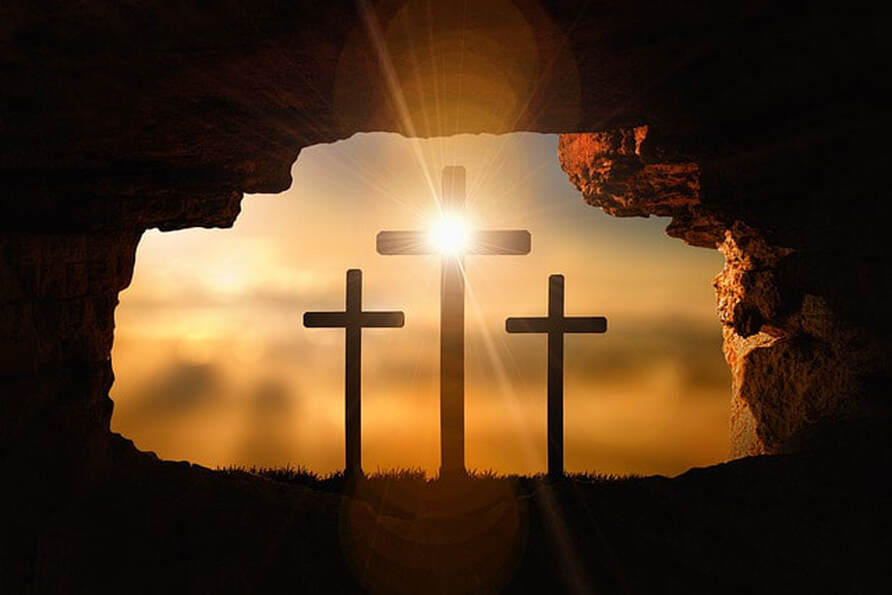 By Jessica Malay This morning in Luke we again see the first meeting of Jesus with the disciples, and it is useful to take a moment and step back from our familiarity with this scene, and put ourselves there. Remember, at this point they have been made aware that others have seen Jesus. They know the tomb is empty. Mary Magdalen and the couple, Clopas and his wife Mary have already seen Jesus. And if St Paul got it right, Peter had a meeting with Jesus also as Paul says in 1 Corinthians 15.3. We have no record of Peter seeing Jesus on his own, as we do with Mary Magdelan, and the Clopas couple. But we do know at that meeting, forgiveness must have formed a huge part. The two most prevalent themes of all the first meetings with the Resurrected Jesus are forgiveness and love. And all of these are set within very humble, very human settings and centre around eating. At the inn in Emmaeus Jesus reveals himself with the breaking of the bread, and in the upper room in our reading today Jesus reveals himself as alive, as a human being through eating the piece of fish. All these meetings after the resurrection are human, but with a difference. They are love-filled moments that reveal what we as human beings can be and are destined to be. There is a gentleness and a humbleness in these very human meetings and I think it is important that when we read these meetings described we sit with them, in the company of the disciples in the quiet and the love. In these meetings peace and forgiveness is made possible by infinite love. Even when Jesus shows the wounds he bears on his body, one feels that he has conquered the horror of those moments. Jesus’s self revelation, his willingness to humble himself so completely even through showing of the marks of violence on his body, takes them beyond the horror, beyond the violence. In John’s gospel that we talked about last week Thomas makes those really cruel comments that he will not believe unless he pokes his hands in Christ’s wounds – and here I think it's quite clear that the disciples told Thomas of Jesus showing his wounds to them. But Thomas takes it the wrong way, he has not seen Jesus and thus he can’t experience the peace and the reconciliation that the viewing of the wounds has effected in the other disciples. Perhaps this is why they are not too hard on Thomas. One hears the echo of John Donne in this moment of the disciples meeting with Christ: 'O death, where is thy sting? O grave, where is thy victory?’ Jesus comes then bringing three gifts: peace, forgiveness, and love. He empowers his disciples to share these gifts around the world and through all time. He gives the Holy Spirit to them and continues throughout the centuries to give it to each person who opens their heart, and indeed does quite a lot of the heavy lifting to get that heart open. The holy spirit is that part of Christ that dwells continually within us. And it is that holy spirit that enables us to experience God’s peace, to practice true forgiveness and to look upon all people with love. We live in expectation that we will be more forgiving, more loving and more at peace. And we see that lived out in the Acts of the Apostles to a certain extent. We see Peter stand up in front of the crowds that he once cowered before, we see him proclaim Jesus…but perhaps most importantly, he forgave them, as he had been forgiven, and he invites them to join them – he even calls them friends, ‘And now, friends’. And now friends, let us in this Easter time also forgive and love, sharing in the great peace that God has always intended for his entire creation. 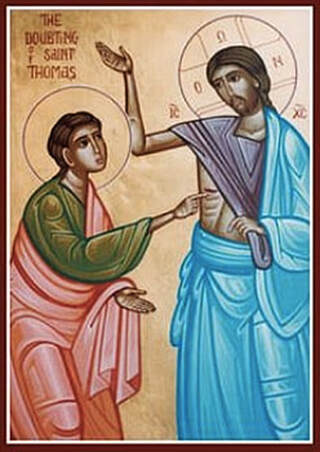 By Jessica Malay ‘We have seen the Lord.’ What a joyous proclamation, a proclamation that brought into being the Christian religion. These people in the upper room, these disciples that in their entirety numbered a little over 100, that remained openly faithful to Christ in those early days, are our forefathers and mothers in faith. 'We have seen the Lord’, the question is, what did they see? This is the question that Thomas asks when he arrives in the upper room. I can imagine Thomas feeling quite angry at this moment of his return, the anger palpable in his response to his friends: ‘Unless I see the mark of the nails in his hands, and put my finger in the mark of the nails and my hand in his side, I will not believe’. This is a pretty strong statement, and a very offensive one. What he is actually saying of course is that he will never believe that Jesus lives. This is the same Thomas, remember, that said he would go and die with Jesus. You can hear the pain of what he sees as Jesus’s betrayal of him. His sense that Jesus abandoned him, that Thomas’s own failure to live up to his commitments, his own knowledge of his weak faith hangs so heavily upon him, that it becomes too painful for him to believe that Jesus really was the Christ, because that would mean he had betrayed Christ. Like the other male disciples, he hid after Jesus’s arrest. Who knows where he was? He separated himself from the other disciples and hid away, likely terrified that he really would be asked to die for Christ. When we do wrong to those we love, the pain is often so great that we turn on the very people we have hurt and hurt them more. Thomas is not only, yet again, betraying Christ, he is deeply wounding his friends in his attempt to cast doubt on their knowledge, their joy. He is attempting to bring them back to the despair he continues to feel. He tries to drag them down with him. We do not know what their reaction to Thomas was, but clearly they did not cast him out. It's not a coincidence that John records the gift of the Holy Spirit coming to each of the men and women disciples just before Thomas enters. The Holy Spirit helped them to forgive Thomas, and helped them to draw Thomas back into their community. This is a good example, one of the great examples, of the way in which God, through our Lord Jesus Christ, never gives up on us, and empowers each of us to help those in pain and grief, empowering us to forgive and to continue to help even those that hurt us. Whatever the disciples in the upper room did, they continued to support Thomas, they continued to invite him into their sure knowledge of the risen Lord. And Thomas does return, and Jesus greeted him, as he greets us, full of love. Thomas repents of his unbelief, he does not violate Christ’s body by insisted on touching the wounds – what a horrible thing to suggest. He sees Jesus, and just knows. I have always envied those disciples of Christ who were graced with his bodily presence. What would it have been like to walk with our Lord on the roads and byways of Palestine? What would it have been like to sit at his feet and listen to his words? We all, I think, long to ‘touch’ Jesus, to experience his physical form near us. And doesn’t always annoy and offend us when people who are antagonistic towards the idea of Jesus Christ as our saviour constantly say, ‘I only believe in things I can see’ How very Thomas of them, and how very limiting, and how they deny that which Christ longs to give them, to have life and to have it more abundantly. And its our job, helped by the holy spirit, to continue to love them, and to show them our Lord Jesus Christ in our words and in our actions. We who believe though we have not seen, are indeed truly blessed. But let's not for one moment think that we are superior. Jesus meets all of us, where we are, in our joys and in our despair. I have been reading the memoir of Charles Raven, a theologian and a naturalist, of the early 20th century. He describes the moment he met Christ as a young man, that moment that transformed him from a man of profound doubts, to a worshipper of Christ. Charles was working in Liverpool, for the council in the Education department, in a year's break before he went back to Cambridge for his higher degree in about 1909. On one afternoon he went to visit a friend who was a curate in a parish in Stoke on Trent. Raven was clearly not impressed by this city, writing ‘For brute ugliness Stoke and its vast and dismal churchyard stand unique.’ Any yet it was here that he met Christ, he writes, ‘My friend was ill: I wandered up to his rooms alone, and the grim tragedy of the place struck me cold with misery. My friend loved the country, and music, and all beautiful things: and he was living in this hell. I found him and behold he was not alone. No other other phrase will express it. Here walking with him in the midst of the furnace was Jesus…He had found that which together we had sought…in the mean streets, God…met me in splendour.’ (A Wanderer’s Way, p. 83). The rest of Raven’s memoir is a working out of what this meeting meant to him, how he was transformed, and how his life became, even in the darkest times in the trenches of France, a life more abundant. I think we can all relate to the truth of Raven’s experience. How many times have we met Jesus and known it? How many times has Jesus stood with us as a presence that has upheld us in times of grief, and gifted us times of incredible joy? In those times, there is no other response, but Thomas’s response: ‘My Lord and My God’. It's good to remember as the country moves into a period of mourning, that Jesus is always with us, even when we are too angry and too hurt to see it. This is what Thomas learned, and was healed. 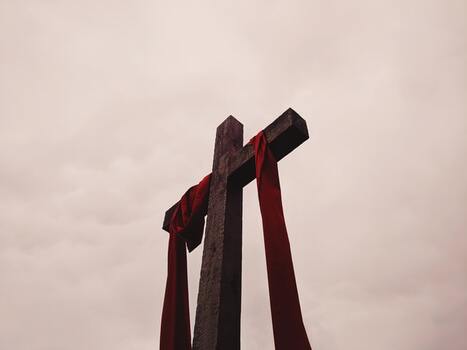 By Jessica Malay Jesus is Lord of All. Today is Easter day, and it is a special Easter day even though we did not do what we used to do. There was no dawn service at Castle Hill, we did not process with the Easter Candle in our robes, there will be no hymns. There will be no common communion cup, no tea and coffees, no handshaking and joyous ‘peace be with yous’ . And yet, we sit together today and we know Jesus is Lord of All. We have learned, as Mary and the other disciples discovered – that Jesus fills everything. There are no voids, no empty places, no absence. There is nothing missing. Jesus’s resurrection put an end to the emptiness that human beings have felt since they began to be cognisant of the world around them. As the gospel writer of John puts it so well: ‘On that day you will know that I am in my Father, and you in me, and I in you’. That day was Easter morning and on that morning nothing, in the entire world, would ever be the same. We often forget this. We are so used to living in a world where we know that God responds to our prayer, where we know that our sins are forgiven even before we ask forgiveness, where we know that Loving one another is the most important act we can perform. We know these things even if at times we find it hard to believe and accept them. Before Jesus’s ministry, sacrifice, and resurrection people didn’t know this, they didn’t think this kind of relationship with God was possible. There was a barrier between human beings and God – a barrier of their own making. If you read the Old Testament, it's so clear that God wishes to be part of human life, but that human beings can’t quite fathom such a thing, and so they created carved images, rituals, and other ways that made them feel like they could at least in some way approach God. And this is true for all people in all places throughout history. But this was not God’s will. And it took sometime before people were quite ready to have the kind of relationship with God that God’ wanted for us, and when the most perfect time came, Jesus was born into this world, The Word was made Flesh, God’s will for each of us became so clear that it could not be ignored. In the space of three days, the world changed. In the space of three days the veil was truly torn asunder for all people, for all time. Jesus lifted all of us, all humanity, into loving communion with the divine. Now, you might be thinking at this moment, actually I don’t know if that is true for me. Like Mary at the empty tomb, or the disciples in the upper room, or Clopas, and likely his wife Mary on the Emmaus road, they were not sure of anything that morning. In fact they thought they had lost everything at the very time they were gaining everything – the whole world. And sometimes that is us, we think that no one is there for us, we doubt, we find ourselves, as the psalmist puts it, we are ‘like unto those who that go down into the pit’ – that age-old metaphor for depression and despair. Many of us have no doubt experienced this kind of despair over the last year, we sit like Mary Magdalen near the tomb weeping, thinking that we are alone, and bereft. And yet she was not. She just doesn’t at first recognize Jesus. Isn’t that what we are like as human beings…so caught up in our own thoughts, our own expectations, that we can’t see joy when it stands right in front of us. But then again, with a little help, we do see. That is what this celebration of Easter is all about. It's not about us doing anything for God, it is about reminding ourselves that we are part of God’s divine love, as Paul puts it so well, that through Jesus Christ, ‘we live and move and have our being’. And we do not, indeed cannot, do anything to make this true for us. It simply is true, for every human being on this earth, that through our Lord Jesus Christ we are one within God’s love and we were all raised on that day. That is what we celebrate at Easter. That is what happened. And you know its much easier to accept God’s love, to accept that there is no veil between us, when we aren’t burdened with having to ‘prove’ his love over and over again to ourselves. When we just turn to our Lord and say with Mary, Rabouni! As you know, one of my favorite passages from Paul, is Roman’s 8.39-9. It really speaks to me because it wraps up all those things we are afraid do separate us from God, and says they cannot. Paul was a man who knew despair and pain and grief and guilt and doubt. But her also knew that despite any particular feeling of the moment this one truth that flooded this world on Easter morning: I am convinced that neither death, nor life, nor angels nor rulers, nor things present, nor things yet to come, nor powers, nor heights, nor depths, nor anything else in all creation will be able to separate us from the Love of God in Christ Jesus our Lord. Jesus Christ’s resurrection on that Easter morning made this understanding possible, not only was the veil ripped in two, it was torn away. Let us live in this Love today, and through each day of our lives, loving each other as Jesus taught us to love, remembering that every day is Easter day, every day we walk alongside our Lord and nothing can separate us from him. |
Archives
August 2022
Categories |
|
|
|
